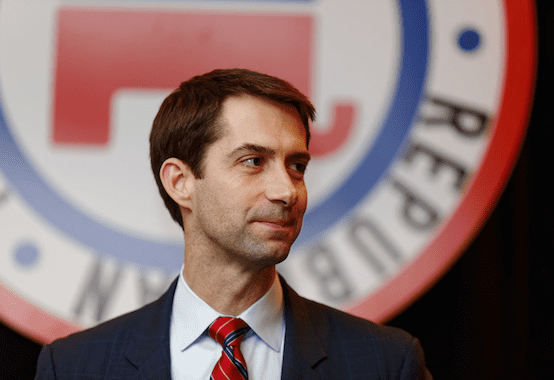The Fanatical Nuclear Deal Saboteurs Return

One of the chief would-be saboteurs of the nuclear deal with Iran, Tom Cotton, laid out what he thinks Trump should in a speech yesterday:
Tom Cotton, a Republican, said Trump should “decertify” Iran’s compliance with the agreement in a report required by Congress every 90 days and next due on Oct. 15. That, Cotton said, would let Congress approve a list of demands that the president could then press European allies who are part of the accord — and reluctant to leave it — to accept.
“The Congress and president should lay out how the deal should change and the consequences for Iran,” Cotton, a member of the Armed Services Committee, said Tuesday evening in Washington at an event hosted by the Council on Foreign Relations. “The world needs to know we are serious, we are willing to walk away, we are willing to impose sanctions and a lot more than that. And they’ll know that when the president declines to certify the deal, and not before.”
If the administration and Congress do this, their new demands will be rebuffed. European allies aren’t going to respond well to an ultimatum, especially when they see no reason for the new list of demands. Iran will use this maneuver as proof of our government’s bad faith, and they won’t be wrong. In the best-case scenario, the U.S. then reneges on the deal and the other parties continue to honor their obligations. That would still leave the U.S. isolated and embarrassed by its incompetent political leaders, and it would create strains with close allies for no reason. In a much worse scenario, a decision by the U.S. to renege on our obligations would give Iran the excuse to ignore theirs, and that could make an attack on Iran once again a real possibility with a president as reckless and a Cabinet as hostile to Iran as we have. That much worse scenario is pretty clearly the one that Cotton wants, and that alone should make us very wary of anything he recommends.
The important thing to remember about Iran hawks like Cotton is that their opposition to the nuclear deal is bound up entirely with their desire for confrontation with Iran and ultimately regime change. Cotton refers frequently to threatening military action and taking such action against Iran throughout his speech and the Q&A afterwards. They hate the nuclear deal because they correctly see it as an obstacle to the instability and upheaval they want to cause, and so they want to do whatever they can to weaken it.
To that end, there is no end to the number of lies they will tell about the deal. For instance, Cotton goes so far as to claim that the JCPOA is “weaker even than the 1994 Agreed Framework with North Korea,” which is just laughably untrue. Even many skeptics of the nuclear deal acknowledge that it is more stringent than the Agreed Framework, and most arms control experts consider it to be one of the strongest non-proliferation agreements ever negotiated. Of course, Cotton can’t acknowledge any of these facts or speak honestly about them, because that would confirm that his hostility to the deal is driven entirely by his hostility to Iran itself.
Cotton’s proposals for “fixing” the deal are all the familiar hawkish tropes we have come to expect. For instance, he wants to eliminate sunset clauses. As I have pointed out before, this is a stupid objection to the deal, since any agreement would contain them, and no deal could be negotiated that wouldn’t contain them. He wants the deal to include restrictions on Iran’s missile programs. In addition to being unnecessary for the purposes of limiting Iran’s nuclear program, there is no international consensus in favor of this, and Iran obviously wouldn’t agree to it. Like the other changes Cotton proposes, it is a non-starter. In other words, Cotton’s “fix” amounts to to making impossible demands in the hopes of blowing up the agreement.
Cotton’s speech is mostly nonsense, and he really outdoes himself when he starts talking about North Korea:
If anything, certifying the disastrous deal with Iran will show the North Koreans that we lack the will to confront them. And, speaking of that, isn’t it curious that North Korea’s missile and nuclear tests have accelerated so rapidly since we agreed to the Iran deal?
In Cotton’s world, acknowledging the reality of Iranian compliance and keeping our word demonstrate a lack of resolve. He can’t seem to grasp that North Korea’s commitment to its nuclear weapons and missile programs in recent years is related to its leadership’s determination not to suffer the fate of Gaddafi in 2011, and that determination would only be made stronger if it saw that the U.S. was reneging on an agreement with Iran. Cotton’s incessant talk about military action against Iran will just confirm their assumption that states that agree to foregoing nuclear weapons will sooner or later become targets of U.S. attack.
The senator also imagines that European allies that have repeatedly and publicly stated their refusal to renegotiate the deal will somehow go along with what he wants, but he doesn’t give any evidence that this is so. That’s usually how hawkish arguments on this and other issues work: they make unfounded claims, they boldly assert that X will happen without being able to give any reason why it would, and they propose unworkable “solutions” that would inevitably make everything worse. In a sane world, Cotton’s recommendations would be laughed out of the room, but unfortunately his views seem to be very close to the ones informing the administration’s approach to this issue.
Comments